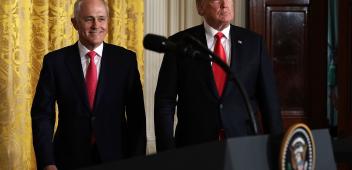Morrison’s secret appointments are a slippery slope
Levels of political trust in Australia are among the lowest in the world and this latest saga will not help matters. Originally published in the Australian Financial Review.

Revelations that former prime minister Scott Morrison appointed himself to five ministerial portfolios without the knowledge of his cabinet ministers or the public has been denounced as a strange, not exactly illegal, yet still serious breach of responsible governance.
But Morrison’s secret ministerial grab is more than strange. As his Liberal colleague, Karen Andrews, bluntly stated, “It certainly doesn’t help democracy and I am very concerned about the impacts of this going forward.”
In Rise of the Extreme Right, I examine the rise of right-wing extremism worldwide. One big contributing factor is the decline of trust in government among people in democracies and the accompanying deterioration of democratic governance. Numerous academic studies have shown consistent levels in democratic decline.
Democratic health in Australia is strong by many measures – the most recent Lowy Institute poll shows a preference for democracy has reached a record high – yet levels of political trust are among the lowest in the world and this latest saga will not help.
There is a perception that politicians are not responsive to the needs of those they govern, or do not include them in decision-making. This perception of “unrepresentative” democracy has led to declining levels of trust and contributed to a rise in anti-establishment and anti-elite sentiment. Morrison’s actions were both a symptom of, and contribution to, this broader democratic erosion.
Accompanying this trend in democratic decline is a growth in the appeal of the strong man model of governance – a get-things-done type of leadership that has disregard for democratic processes and norms.
“As prime minister, only I could really understand the weight of responsibility that was on my shoulders and no one else,” Morrison has said.
“And as a result, I took the decisions that I thought I needed to take.”
This statement has strong echoes of former US president Donald Trump’s inaugural speech in which he presented a dystopian vision of American society and declared: “I alone can fix it.”
Radical alternatives
Eroding trust in elected officials and perceptions, or actual instances, of corruption have provided opportunities for anti-democratic forces to capture the disaffected and disenfranchised.
I am not suggesting that the revelation of Morrison’s secret portfolios will lead to a spike in far right, anti-government and anti-democratic extremism. Extremism and polarisation do not tend to happen all at once but gradually, over time.
However, the conduct of elected officials – particularly their integrity and transparency, or lack thereof – determine the health of our democracy. When people don’t see themselves represented in mainstream politics, believe their politicians to be corrupt, or untrustworthy, and can no longer trust institutions and leaders of government, they will either check out of their obligations as democratic citizens or seek alternatives. Some of these are radical, legitimise violence and further delegitimise democracy.
We have seen in the past that crises – such as the pandemic – have been used as opportunities to accumulate greater executive power in both non-democratic and democratic countries.
Emergency powers
Already there is discussion among some anti-democratic movements in Australia, particularly those that emerged during Canberra’s response to the pandemic, that Morrison’s secret ministerial appointments were evidence of what they said was happening all along – a “secret cabal” controlling our lives and COVID-19 measures that were attempts at authoritarian control.
When fronting reporters, Morrison repeatedly said his ministerial appointments were effectively a form of emergency powers. But in democracies, states of emergency must be officially declared and his assumption of additional portfolios was not.
Morrison further maintains that because he did not exercise those powers, there is no cause for concern and that because he was an elected prime minister his actions were evidence he did not act in an undemocratic or unlawful way. But democracies are more than elections, they stand on norms and principles that we cannot always legislate but which all citizens, especially elected leaders, must uphold.
This is why it has been so critically important that there has been near-universal condemnation of Morrison’s actions by both sides of government.
The lack of politicisation of the issue will limit the damage of Morrison’s secret manoeuvres and blunt the ability of anti-democratic forces to capitalise on this episode. Unlike the US Republican Party, which has enabled and justified the mendacity of Trump, the Coalition has so far resisted a partisan defence.
This will go a long way to mitigating the damage.



